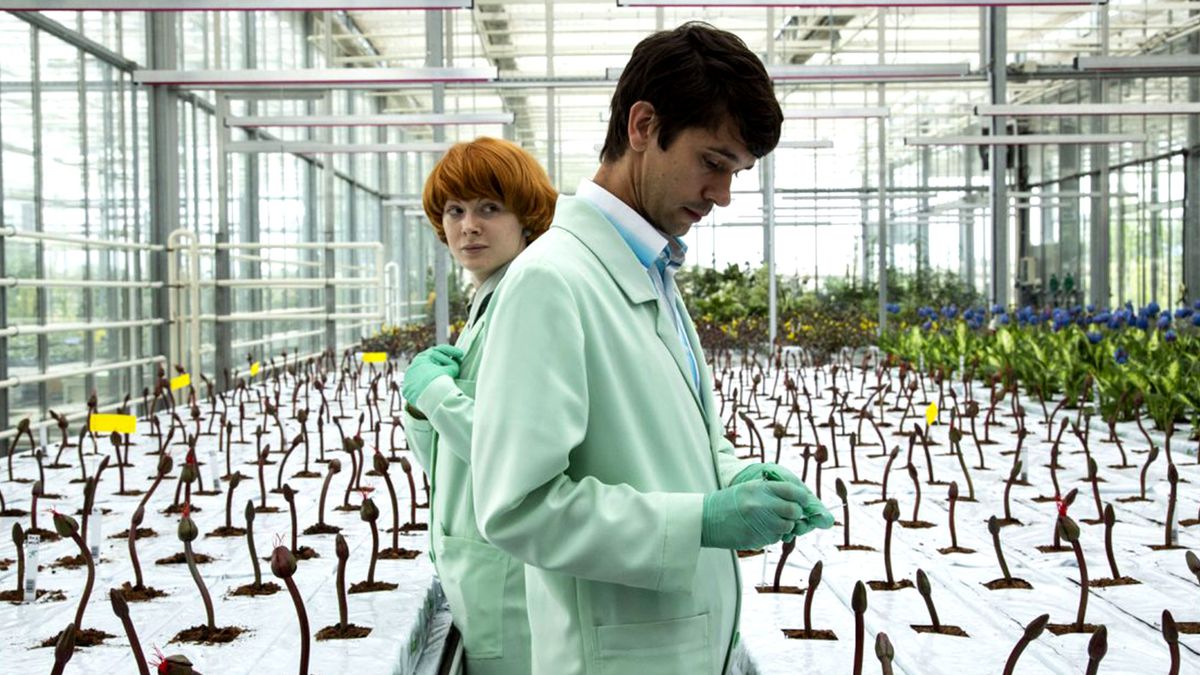Dir: Jessica Hausner
In a lab in London, Alice (Emily Beecham), Chris (Ben Wishaw) and their colleagues work on genetically engineering plants. Alice’s current project is trying to create a flower that smells beautiful and releases pheromones that will make people happier. She seems to be on the verge of success, but another scientist, Bella (Kerry Fox) suspects that the plant - the ‘Little Joe’ of the title - may have some disturbing side effects on those who have been exposed to its pheromones.
Little Joe is both exactly what you would expect Jessica Hausner’s new film to be and a massive departure for the director. It retains all of the signature visual style she has laid down in her four features to date, but applies them in a new context I couldn’t have predicted she’d be interested in: a genre film.
Certain texts are evergreen, always ripe for if not a direct remake then a reinterpretation. Jack Finney’s Invasion of the Body Snatchers is one of those. It’s not hard to see why, the themes of people being systematically replaced with aliens who, while able to emulate humans, lack qualities like emotion and empathy are powerful and can be applied as a metaphor to many times and situations. Little Joe is essentially Hausner’s slow-burning take on this old, old story. She takes the themes in several directions, playing with our interpretation as the film goes on. For instance, has Chris been changed, or are scientists generally this rigid and unemotional, particularly when a deadline is bearing down? There is also Alice’s 13-year-old son Joe (Kit Connor), is his recent change in attitude towards his Mum driven by the Little Joe she brought home for him, or is he just 13? There is also an overarching theme here about the artificiality of emotion and the irony of the effect Little Joe might be having on people, given that what Alice wants is to promote happiness. It’s only late on that she seems to worry about the sincerity of that happiness.
Generally, what an audience looks for from an actor - consciously or not - is some degree of truth. That makes Little Joe a challenging film to act in, because we are always supposed to be questioning the truthfulness of the emotions of all the characters. In this way, Ben Wishaw probably has the most difficult part, as it is he who we are led to believe might be ‘infected’ earliest. He plays it pitch-perfectly; yes, Chris changes, but the screenplay allows us to question whether that is because of the plant or other more commonplace influences. Emily Beecham achieves a similar balance, making us question more with each passing scene her reactions to what she’s seeing around her, whether her sudden remove from her son is driven by him changing or her sharp focus on Little Joe.
Artificiality is also a concern in Hausner’s style. Both language (Hausner co-wrote the screenplay with her regular collaborator Géraldine Bajard) and visuals are notable for their formalism. The fact Hausner is writing in a second language may partially account for the incongruity of some of the language, for instance, the fact that contractions are almost never used, but this also has the effect of making the film’s world feel a little offset from our own even before we know what may be happening with Little Joe. Visually, Hausner sticks largely to straight lines, sharp edges and splashes of colour, whether those colours are pastels in the background or the vivid red of the ranks of Little Joes. In a way, Hausner’s environment is as controlled as that of Alice’s plants. Everything is designed to precision, from Hausner’s framing to Emily Beecham’s haircut and costumes. The unusual soundtrack also plays a part in this design, with score and sound design blending so seamlessly that separating them is almost pointless. The plucked strings of the score are often set against random noises (particularly various growling and roaring animals) to unconventional and striking effect.
Little Joe is a surprising work from Jessica Hausner, reinforcing her style while diversifying her themes and the move into English has done nothing to diminish her powers as an actor’s director. The themes may not have quite the same immediately apparent, urgent contemporary resonance as some of the official versions of Invasion of the Body Snatchers, but there is a thread here about our disconnected state that is both blackly funny and resonant. The idea may be familiar, but the delivery is truly individual.
★★★★


No comments:
Post a Comment